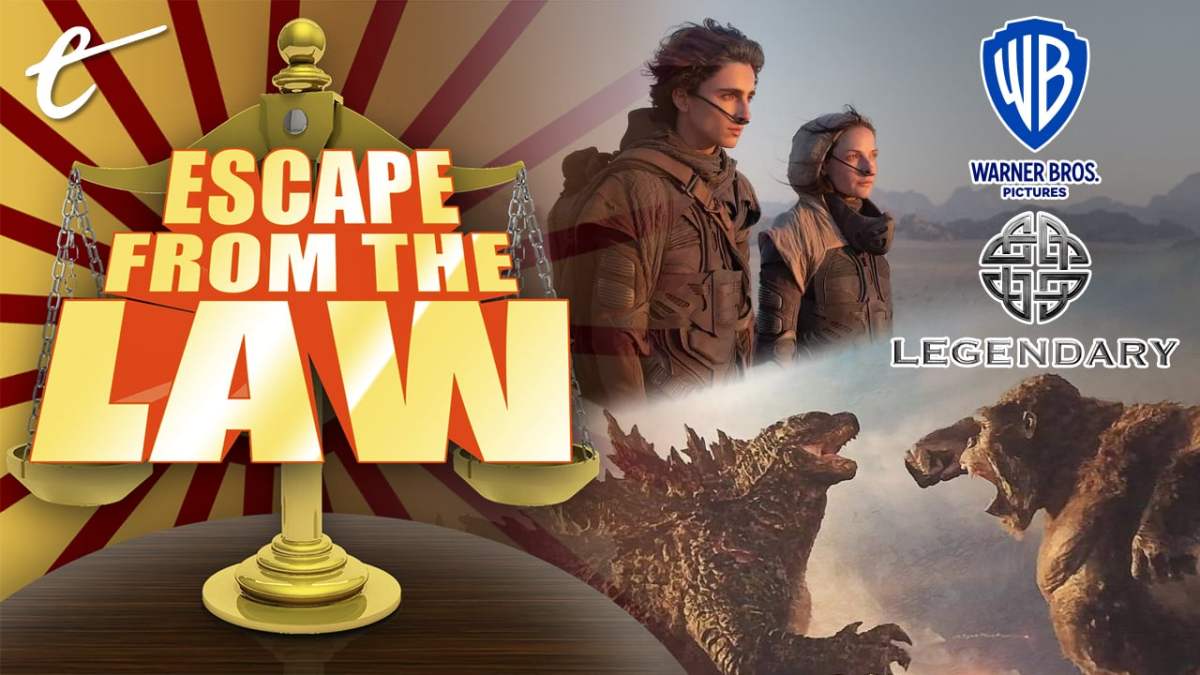Earlier this month, Warner Bros. stunned moviegoers when it announced that each of its films scheduled for 2021 would be released on streaming platform HBO Max on the same day as its theatrical release. The announcement was not well taken, as stakeholders from across the industry voiced objections and production companies have even threatened litigation. This week, I’ll consider the legal issues involved, including the viability of the potential lawsuits.
At the end of every semester, law school students go through a rite of passage, as they are confronted with tests that would seem insane to anyone outside of the legal community. Law school exams are not multiple choice. Instead, they describe a complex series of interlocking disasters and require the test-takers to sort everything out. Here’s a short example to give you a sense of what I’m talking about:
A city built a levee to prevent flooding in the event of excessive rain. The levee didn’t work. The concrete that had been used to build the levee was defective. Public and private inspectors should have caught the problem but didn’t. Some residents tried to escape the flood by standing on ladders. The ladders were defective, causing several residents to sprain their ankles. The ladders were also swept away by the flood and ended up hitting a drunk doctor on his way to perform a life-saving surgery, causing a concussion. The doctor was the only person qualified to perform the operation and so decided to continue. The patient was injured as a result. Also, the increased water levels that led to the flood were caused by global warming, and two major oil companies are responsible for 40% of the global warming-related emissions. Who can be held legally responsible for what?

As you can see, these hypotheticals are absolutely bonkers and are designed to throw in as many wrenches as possible. This style of exam question is relevant here because the COVID-19 pandemic — and the resulting legal challenges — might legitimately cause one to wonder if we are nothing more than figments of some sadistic law professor’s imagination. The potential contract dispute between Warner Bros. and its distributors (and others, including actors, vendors, theaters, stockholders, etc.) proves the point, since their dispute implicates nearly every principle of contract law, but it evades clear and definitive answers.
Before we break it all down, two quick notes:
First, the analysis presented here relates to all of Warner Bros.’ contracts that are impacted by their straight-to-streaming announcement, rather than to a specific individual contract. The most relevant of these contracts will be contracts between Warner Bros. and the production companies that made the movies, but the analysis will be relevant to any contract that assigns payment based on box office revenue. For obvious reasons, anyone who is promised a percentage of box office revenue has reason to object to a streaming distribution plan that is likely to reduce or eliminate that revenue. This is the same issue that motivated the 2008 writers’ strike.
Second, the analysis presented here is based on widely accepted contract norms that govern most contracts. The actual contracts at issue here, however, are not publicly available, and they could contain provisions that change the way these rules normally work.
Now let’s dive in.

Are WB’s Contracts Still Valid and Enforceable?
Unclear. There are several principles of contract law that would support a plausible argument that the contract is not valid or enforceable.
Frustration of Purpose
A contract entered into for a specific purpose can be rescinded if an unforeseen event (i.e., the pandemic) undermines the intended purpose. For example, if I book a hotel room at a higher-than-normal price so that I can have a good view of a parade that passes nearby, and the parade is canceled, I am entitled to walk back the contract and obtain a refund. For Warner Bros., whether its contracts are still valid depends on the purpose of the contract.
If the purpose is primarily to facilitate theatrical distribution, then one could argue that purpose has been frustrated by the pandemic — there is no point to showing a film in theaters if people are unable or unwilling to buy movie tickets. On the other hand, if the purpose is to facilitate distribution in general, then frustration of purpose would not apply, since the intended purpose could still be achieved through streaming distribution.
Force Majeure
A force majeure is an unforeseeable circumstance that prevents a party from performing under the contract. This includes events like natural disasters or war. It’s an open question whether the COVID-19 pandemic would qualify.

Would Warner Bros. Actions Constitute a Breach?
In general, a party cannot be viewed as breaching a contract unless it fails to perform as required by the contract. Thus, in a shipping contract, there is no breach unless and until a shipment is missed. Under that principle, Warner Bros. could not have breached its contracts, since none of the affected films have been released.
That general principle, however, doesn’t tell the whole story. There is a concept in contract law called anticipatory breach. Under that doctrine, a party can be treated as breaching a contract if it announces its refusal to honor the terms of the agreement — even if a literal breach has not yet occurred. Under this view, Warner Bros.’ announcement could constitute a breach. The problem is that it is hard to say whether Warner Bros.’ anticipated actions would constitute a breach, since that answer could depend on whether theaters will be open at the time of each release.
Of course, the answer to this question also depends on whether the means of distribution are specified in the relevant contracts. If the contract gives Warner Bros. control over how to distribute the films, then there would be no case for breach of contract, regardless of the pandemic.

What Kind of Damages Are in Play? How Much Could Legendary or Other Producers Expect to Recover?
In general, when a party breaches a contract, the non-breaching party is entitled to damages that would put it in the position it would have occupied if there had been no breach. (These are called expectation damages.) Thus, Legendary and other production companies would be entitled to the difference between the revenue earned under Warner Bros.’ new distribution model and the revenue they would have earned if Warner Bros. honored the traditional distribution windows.
For obvious reasons, it would be difficult for Legendary (or others) to prove their damages, both because we don’t have good data to model pandemic viewing patterns and likely revenues, as well as because the available data would be skewed by streamers who would have attended a theatrical release but decided to watch on HBO Max instead.
But expectation damages would only apply if the contracts are still valid and enforceable. If the underlying contracts are invalid (potentially for the reasons identified above), then parties to the contract could receive damages equal to the value of their contribution. Alternatively, if the production companies could prove that Warner Bros.’ decision was motivated by a desire to profit at the expense of its production partners, then they may be entitled to some of Warner Bros.’ profits — including, potentially, profits from subscriptions to HBO Max — under a theory of unjust enrichment.

How Is This Dispute Likely to Play Out?
I don’t think this case is likely to see the inside of a courtroom, for two reasons. For one thing, Warner Bros. knows that its streaming announcement was not received well, and it is already offering a fairly comprehensive compensation package to several (if not all) of the affected parties. For some, this simply involves Warner Bros. paying off its contractual obligations. For example, as reported by Deadline, those involved with Wonder Woman 1984 and The Witches — which are essentially skipping a theatrical release altogether — were paid as if those films had earned $1 billion at the box office.
For the films slated for 2021, Warner Bros. has adjusted all box-office based payouts so that they are inversely proportional to the percentage of theaters that are open (i.e., the less theaters that are open, the higher the payout rate for the producers). While these offers may ultimately prove unacceptable to the interested parties, they show that Warner Bros. recognizes the need to compromise and make concessions, and it suggests that the parties will be able to resolve this problem amongst themselves.
The second reason why I don’t think this dispute will result in meaningful litigation is because the likelihood of success (for either party) depends too much on the state of the pandemic at the time of release. It is easy for production companies to complain now about a potential future loss. But without knowing how many theaters will open, there is no way to know whether Warner Bros.’ distribution plan will result in any loss or whether it is an efficient breach that results in savings and profits for everyone.
Law school exams are hard and often seem unfair. But if there’s anything to be learned from the COVID-19 crisis, it is that no scenario is too crazy for the real world. Law professors should start taking notes, because if they’re not careful, they might find themselves replaced by studio executives with more imaginative minds — especially since, if things keep going as they are, I know a few studio executives who may be in the market for a new line of work.






Published: Dec 20, 2020 03:00 pm